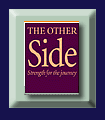Written by lesbian feminist Virginia Mollenkott, Omnigender
has been hailed as "marvelous... a big book..[that] ends one period
in the epic struggle of Christianity with homosexuality and opens another."
(Mary E. Hunt, Women's Alliance for Theology, Ethics and Ritual -- WATER).
Letty Russell of Yale Divinity School calls it "a courageous crossing
of gender boundaries that pushes us beyond our carefully constructed categories."
Transsexual Kate Bornstein calls it "a landmark book filling...a major
void in transsexual writing: the missing bridge between traditional religious
doctrine and secular postmodern theory." Dana Rivers from International
Foundation for Gender Education says the book "gives transgendered people
the chance to reclaim their connection to God." And Mollenkott herself
says Omnigender is "from first to last, a labor of love, the book
I was born to write.
Virginia Ramey Mollenkott contends that the common understanding
of gender as two opposite sexes is woefully inadequate. In fact, she argues
that this "binary gender paradigm" is oppressive and inflicts grave suffering
on many people.
Identifying ways in which this paradigm is harmful to people,
Mollenkott moves beyond the current gender construct to offer vision of
a new, more flexible gender paradigm which she terms "omnigender."
In proposing a new paradigm, Mollenkott offers a vision of
what such an omnigendered society might look like and offers suggestions
for the educational, scientific, and political steps it will take to get
there.
"The binary gender construct has been and continues to be
of life-and-death importance to those who cannot meet society's unrealistic
requirements," writes Mollenkott. In Omnigender: A Trans-religious
Approach, she shows how shifting gender paradigms will liberate individuals
and make our society more truthful and just.

|

All books also available at:

|
|
